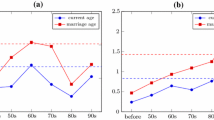Abstract
We consider one-to-one matching markets in which agents can either be matched as pairs or remain single. In these so-called roommate markets agents are consumers and resources at the same time. Klaus (Games Econ Behav 72:172–186, 2011) introduced two new “population sensitivity” properties that capture the effect newcomers have on incumbent agents: competition sensitivity and resource sensitivity. On various roommate market domains (marriage markets, no-odd-rings roommate markets, solvable roommate markets), we characterize the core using either of the population sensitivity properties in addition to weak unanimity and consistency. On the domain of all roommate markets, we obtain two associated impossibility results.
Similar content being viewed by others
References
Chung KS (2000) On the existence of stable roommate matchings. Games Econ Behav 33: 206–230
Crawford VP (1991) Comparative statics in matching markets. J Econ Theory 54: 389–400
Demange, G, Wooders, M (eds) (2004) Group formation in economics; networks, clubs and coalitions. Cambridge University Press, Cambridge
Diamantoudi E, Miyagawa E, Xue L (2004) Random paths to stability in the roommate problem. Games Econ Behav 48: 18–28
Gale D, Shapley LS (1962) College admissions and the stability of marriage. Am Math Mon 69: 9–15
Jackson MO (2008) Social and economic networks. Princeton University Press, Princeton
Klaus B (2008) Competition and resource sensitivity in marriage and roommate markets. Harvard Business School Working Paper 09-072. http://ideas.repec.org/p/hbs/wpaper/09-072.html
Klaus B (2011) Competition and resource sensitivity in marriage and roommate markets. Games Econ Behav 72: 172–186
Klaus B, Klijn F (2010) Smith and Rawls share a room: stability and medians. Soc Choice Welf 35: 647–667
Özkal-Sanver I (2010) Impossibilities in roommates problems. Math Soc Sci 59: 360–363
Roth AE, Sotomayor MAO (1990) Two-sided matching: a study in game-theoretic modeling and analysis. Cambridge University Press, Cambridge
Roth AE, Van de Vate JH (1990) Random paths to stability in two-sided matching. Econometrica 58: 1475–1480
Sasaki H, Toda M (1992) Consistency and characterization of the core of two-sided matching problems. J Econ Theory 56: 218–227
Thomson W (2009) Consistent allocation rules. Monograph. Forthcoming
Toda M (2006) Monotonicity and consistency in matching markets. Int J Game Theory 34: 13–31
Author information
Authors and Affiliations
Corresponding author
Rights and permissions
About this article
Cite this article
Can, B., Klaus, B. Consistency and population sensitivity properties in marriage and roommate markets. Soc Choice Welf 41, 835–862 (2013). https://doi.org/10.1007/s00355-012-0708-9
Received:
Accepted:
Published:
Issue Date:
DOI: https://doi.org/10.1007/s00355-012-0708-9




